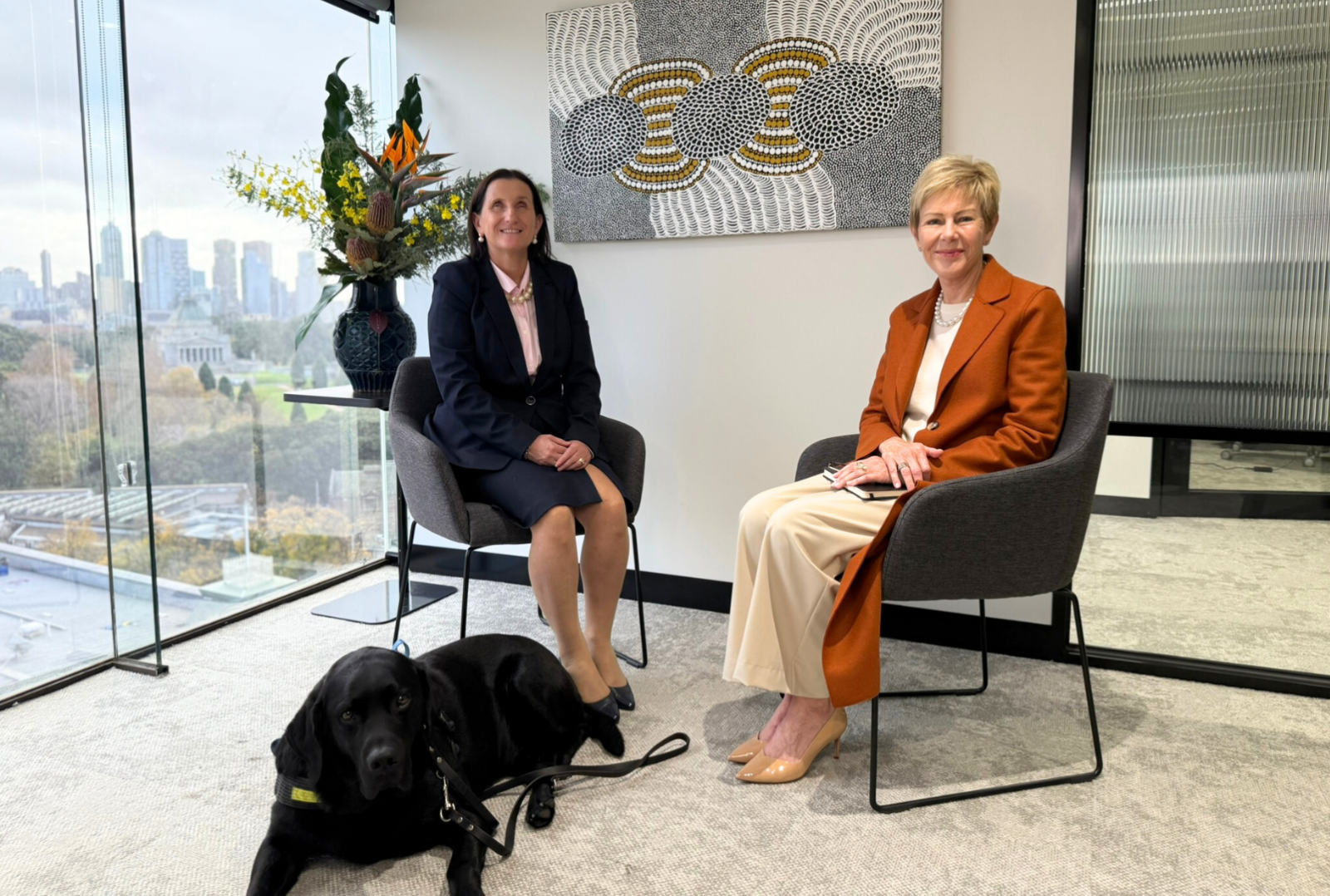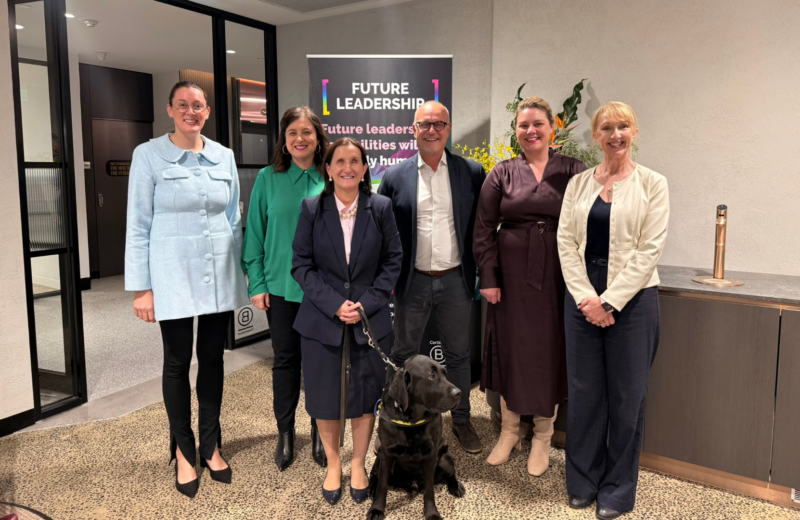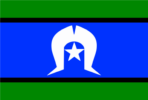
In Conversation: Dr Theresa Ruig and Jo Fisher
“My lived experience is not a limitation, it’s a leadership lens.”
– Dr Theresa Ruig
It was really wonderful to welcome Dr Theresa Ruig, recipient of the Jo Fisher Future Board Scholarship, to the Melbourne office of Future Leadership last week. Theresa sat down with co-founder and director Jo Fisher to share her views on inclusive board leadership, accessibility, and the strategic value of lived experience in governance. The conversation was candid and wide-ranging, and one that hit home about why representation matters at the highest levels of leadership.
Now in its third year, the Jo Fisher Future Board Scholarship supports aspiring board directors from diverse backgrounds to complete the Australian Institute of Company Directors (AICD) course and receive tailored mentoring to prepare for impactful board roles.
In the discussion below, Dr Ruig reflects on what motivated her to apply, how her lived experience has shaped her leadership lens, and why accessibility must be seen not as compliance but as a competitive advantage.
Scroll down to watch the full video and read highlights from the conversation.

Dr Theresa Ruig met with the Future Leadership team after her insightful conversation with Jo Fisher on inclusive board leadership.
Theresa’s motivation to apply
For Dr Ruig, the decision to apply for the scholarship emerged from a period of pause and reflection.
“Last year, I was at a career inflection point,” she shared. After a long career across higher education, governance, and the not-for-profit sector, she was exploring how to reorient her impact. “When my younger brother passed away, I took a break from work to ask, ‘What do I want to do next?’”
That time of reflection led her to complete a Social Impact Fellowship and explore roles in diversity and inclusion, but something deeper was calling.
She says her passion for accessibility and inclusion made her consider how she could advocate more effectively at the board level.
With eight years since her last board role, she saw the scholarship as a timely opportunity to re-engage. “I believe in serendipity,” she said. “The scholarship appeared at the right time. Applying affirmed my confidence to move back into this space.”
Lived experience as leadership
Dr Ruig’s background spans academic research, education, people and culture, and board governance, but at the centre is a commitment to creating environments where others can thrive.
“My time in the disability sector taught me to value lived experience as an asset,” she said. “I’ve been a client, a volunteer, a staff member, and a board member. Bringing those perspectives together, that’s a strength.”
She believes accessibility should not be an afterthought or compliance measure, but a strategic priority. In the disability sector, accessibility is a competitive advantage. It enables organisations to thrive in services, workforce, and offerings.
It’s a mindset she hopes to influence boards to embrace more openly. She says that boards are thinking more about cybersecurity, they need to think about accessibility the same way: as a strategic issue that spans products, services, stakeholder engagement, and workforce.
What accessibility really means
For Dr Ruig, accessibility in leadership is not just about physical ramps and lifts. It’s a holistic lens that organisations must apply across their products, services, workforce, and stakeholder experiences.
“One in five Australians has a disability. That’s untapped potential. Participation rates for people with disabilities are 53%, compared to 84% for those without. Organisations facing workforce shortages should explore this.”
She urges leaders to treat accessibility as a core strategic concern, not an afterthought. It should be a strategic priority, not a compliance box.
Technology as enabler and barrier
For Dr Ruig, technology has been both a gateway and a gatekeeper. “Technology has enabled me to do things and have a career that perhaps 30 years ago I may not have been able to do,” she said, referring to the role of screen readers and other adaptive technologies that allow her to engage fully in professional environments.
But she was quick to point out that technology can also become a significant barrier, particularly when internal digital systems used by staff are not built with accessibility in mind.
“You might hire a person with a disability, but if your systems aren’t accessible, you’re not setting them up for success. They may not be able to do their job well. They may not be able to achieve their potential.”
This, she says, is a missed opportunity for organisations. Accessibility shouldn’t stop at customer-facing channels. It must be embedded into procurement decisions, system design, and internal communications.
“Have you thought about accessibility in the design thinking phase? Have you gathered input and voices from people with diverse access needs before rolling out new tech?” She challenges organisations to treat digital accessibility as a strategic priority: Are your systems accessible? Are your communications inclusive? These are strategic questions, not afterthoughts.
Applying her new qualification
While Dr Ruig appreciates formal education, what excites her most about the AICD course is not just the qualification itself, but what it represents: a deep dive into the real, complex issues boards are grappling with today.
“I love a qualification. But it’s also about understanding contemporary board issues and learning from others.”
For her, the learning isn’t isolated to theory, it’s about insight-sharing, expanding perspectives, and exploring how leaders in other sectors are responding to shared challenges.
“I’m very much about that sort of social learning that occurs when you’re working and learning with other people and how you can take that to change your own perspective.” Her aim is to combine that learning with her own evidence-informed approach, measuring what matters, asking different questions, and contributing a lived experience lens to the governance conversation.
Broadening impact across sectors
While Dr Ruig has deep roots in the disability sector, she is ready to broaden her impact. With experience in education, people and culture, and human services, she is focused on sectors where her values, expertise, and lived experience can converge.
“I have a love for education, health, human services, but beyond that as well. It’s about how I take my skills, lived experience, a passion for accessibility and inclusion into any sector that aligns with my values.”
Her sights are set on boards willing to lead with courage. “Boards that are willing to be innovative in this space, that’s where I see the potential to position accessibility and inclusion as a strategic advantage.”
Parting reflections
As the conversation drew to a close, Dr Ruig offered a thoughtful encouragement to future board members and aspiring leaders navigating uncertainty or self-doubt:
“You’ll never ever be ready for something. So don’t wait till you’re ready to try. Just step off the cliff and give it a go.”
She underscored the transformative power of representation:
“We can’t underestimate the value of representation. Until we see more diverse people on boards and in organisations, we won’t advance the change we want to see. You’ve got to see it to be it.”
These closing words reflect not only her conviction but her call to action, a reminder that inclusive leadership is both a personal journey and a collective responsibility.
Theresa’s story is a powerful reminder that when we design for inclusion, we don’t just open doors, we reimagine what leadership can look like.
About Jo Fisher Future Board Scholarship:
The ‘Jo Fisher Future Board Scholarship’ is awarded annually by Future Leadership to support emerging leaders from underrepresented backgrounds to prepare for board service.
🔗 Read about the scholarship and how to apply.
About Dr Theresa Ruig:
Dr Theresa Ruig is an academic, accessibility advocate, and leadership strategist with a PhD in social impact. Legally blind since the age of 10, she brings lived experience and research expertise to the boardroom, championing inclusive governance and systemic change across sectors including education, health, and not-for-profit.
About Jo Fisher:
Jo Fisher is the Founding Director of Future Leadership and a recognised leader in executive search and board advisory. She established the Jo Fisher Future Board Scholarship to elevate underrepresented voices in governance and continues to mentor and advocate for inclusive, forward-thinking board leadership.


